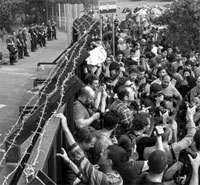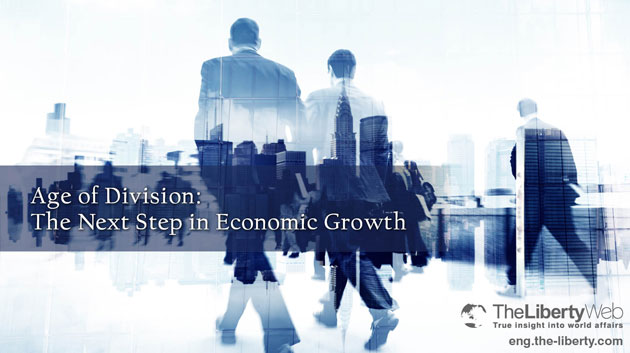Age of Division: The Next Step in Economic Growth
In June this year, China’s Shanghai stock market bubble burst, and stock prices are falling simultaneously around the world. The question is, to what extent this influence will spread. Some economists posit that there will be a crash on par with the Lehman crash while others state that this is just the beginning, warning of a large-scale depression in 2017.
Economic Prosperity Is Quick Circulation
The state of economic prosperity signifies a fast-paced circulation of people, goods, and capital. With the June bursting of the China bubble, the flow of money in the world has been interrupted. Not only that, but the flow of people and goods appear to be under threat of division.
In Europe, the refugee crisis is unfolding. Countries have now reinstated national borders despite their removal by the EU, which champions the freedom of movement. The EU was established in 1993 based on the idea of the free movement of people, goods, and capital within the region. However, with different nations responding differently to the refugee crisis, the EU is facing severe internal divisions.
In America, Donald Trump, the Republican Presidential candidate and businessman known for advocating the construction of a wall on the Mexican border, has gathered the support of mainly Caucasians who disapprove of immigrants.
In both Europe and America, racial and ethnic tensions are rising.
Is World Economy Sailing through Dangerous Waters?
Has the Age of Division and Segregation Come About?
Money: The bubble burst in China slows down the flow of funds
Things: Bloc economy emerges due to elements such as TPP
People: The EU denies the freedom of movement for people. America divides due to immigration issues.

A fence built on the border of Hungary. The EU philosophy of the ‘freedom of movement for people’ is being denied. (Photograph courtesy of Reuters-afro)
The division of ‘goods’ is mainly due to economic trends tending towards the creation of regional blocs. The EU itself allows for free trade within its region, as does the TPP (Trans-Pacific Partnership), which in recent years Japan had been debating whether or not to join. After the Great Depression during the 1930s and during WW2, England and America created a bloc economy by raising tariffs, and shutting out trade with countries outside of their region. This had a significant impact on the world economy. Duringthis trend towards the creation of bloc economies, the world’s industrial production decreased by 30%, and the overall world trade fell by 60%.
For this reason, after WW2 nations around the world worked to advance free trade. Since 1995, negotiations with the WTO (World Trade Organization) have continued, but this came to a stop in 2001. America, on the other hand, signed NAFTA (North American Free Trade Agreement) with Canada and Mexico in the 1990s. If the TPP, which will also serve to contain China, is successfully achieved, a Pacific Rim bloc economy centered around Japan and America will come to bear fruit.
Indications of a world heading toward recession, anti-immigration movements, and bloc economies all closely resemble the pre-WW2 period. During that period, Japanese immigrants were rejected much like the Syrian refugees are today.
If the disruption in the flow of people, goods, and capital, and the subsequent stagnation in economic activity was the primary cause of WW2, our current world economy may be sailing through dangerous waters.
The Role of the World’s Wealthiest Country
If there is a strong force that is segregating the flow of people, goods, and capital throughout the world, it is the role of large nations to connect these cycles and ‘grow the economic pie’. In the case of the flow of capital, the country that is making the greatest investments and loans throughout the world is Japan. In 2014, Japan’s net external assets (that is, the total property owned by the Japanese government, companies, and individual investors minus liabilities) amounted to a record breaking approximate of 367 trillion JPY. This marked the 24th successive year for which Japan was the world’s wealthiest country.
As the country that is creating the world’s greatest flow of money, Japan must act. Around the 1900s, England was the main source of investments and loansto developing countries; around WW1 and WW2 it was America. From around 20 years ago, this role has shifted to Japan.
This was because the Japanese people worked diligently in the post-WW2 period to revive their economy to the point where the total of household financial properties equaled 1.7 quadrillion JPY. Japan is now using that ‘labor of the past’ as principal in loaning money to developing countries. The people of developing countries are paying off the interest with ‘labor of today’, and will return their loans with ‘labor of the future’. In other words, Japan is creating a place for the ‘labor of today’ and the ‘labor of the future’ in developing countries.
Becoming an Export Superpower, and the Creation of Something New
America is the country with the world’s greatest debts, and yet they are still assuming the role of circulating money to developing countries. Its reputation, however, is quite poor. This is because it is the American style of business to aim to achieve profits in a short time period, meaning that it withdraws investments and loans at the sight of the smallest loss. This was the case in the Asian financial crisis of 1997, and consequently, the Southeast Asian economy plummeted.
The need to change this Americanized ‘global standard’ to a more long-term and stable system has already been discussed in the hardcopy publications of The Liberty Magazine. The point discussed was that there is a need to spread the Japanese style throughout the world, where small short-term losses can become long-term profits through diligent effort and honesty.
Then, what role should Japan fulfill regarding the division of ‘goods’ around the world?
There are extreme debates going on around the TPP where some people think that ‘import is losing and export is winning’. The real international trade, however, does not function in such a manner where only particular countries gain, and other countries lose. In truth, there is potential for a win-win situation exactly similar to the trade of goods within a single country: if one country creates ‘things’ or services that have particular strengths, it can gain profit through trading them with other countries.
Within this system, the role of large nations is to raise the industrial level of developing countries, such as buying their farm products and investing in their manufacturing base. Then, the people of developing countries will gradually become wealthier, and will be able to afford expensive products from overseas.
In this sense, Japan’s protective trade with its high tariffs, which is restricting the world economy, is the epitome of irresponsibility. Protective trade exists to ‘buy time’ for developing countries until their industry reaches the stage where they can begin exporting their products overseas. Japan, as a large nations, should be on the receiving end: an ‘importing superpower’.
This also means that Japan must continue to create ‘goods’, services, and industries with high added value. In order to expand the flow of goods, we must bear a sense of responsibility to the world, and challenge ourselves with an entrepreneurial spirit.
Accepting Immigrants Is an Obligation
Expanding the Cycle of People, Things, and Money: Japan’s Role as a Superpower Nation
Money: Spreading the ‘Japanese Way’ of earning over a long-term period through diligence and sincerity
Things: Becoming a great importer nation that buys things from developing countries such as farm products
People: Accepting immigrants, and preparing a step for them to become Japanese people

The system appears to be allowing Indonesian and Filipino nurses to enter Japan and work, but they will be forced to return to their countries if they do not pass a Japanese state examination in the interim. (Photograph courtesy of Yomiuri Shimbun – afro
Of the flow of people, goods, and capital, the one that poses the greatest problem is ‘people’. Looking back over history, the great nations of each era have been actively accepting immigrants. The secret behind America’s growth and progress of the last 200 years lies in the many immigrants who are accepted yearly. The American Dream is still there, and many young and ambitious people come from all over the world, working hard to achieve success.
As mentioned above, Japan is creating the ‘labor of today’, and ‘labor of the future’ in developing countries, using the money saved from the Japanese peoples’ ‘labor of the past’. Even still, there is much labor left over in these developing countries. Developed countries are being pressured to ‘import’ this labor, but Japan continues to reject the idea.
In “Dawn Will Follow Any Night”, Master Ryuho Okawa, founder of Happy Science, said the following regarding this Japanese ‘selfishness’:
In the Meiji era, Japanese people would go to America and worked in jobs like washing dishes. But many of these people ended up becoming Japan’s greatest people and important political figures. Therefore, it is Japan’s turn to accept personnel from overseas. It is our obligation. There is much Japan has to offer them.
Management consultant Peter F. Drucker posited that it is inevitable that Japan accept immigrants, and estimated the yearly intake to become 500 thousand. Until the low birthrate began in the 80s, Japan’s yearly birthrate was 1.5 million, but now it has dropped to around 1 million. Immigrants can fill that gap.
Preparing the Steps Toward Becoming a Japanese Citizen
Many Japanese people erroneously associate immigrants with crime; but there is a way to erase this mistaken notion. The method is to prepare detailed steps necessary for immigrants to adapt to Japanese society and become ‘respectable Japanese’ people.
For instance:
- Assisting developing countries and building Japanese language schools for them to teach the language and basic manners. The best students will be sent to Japan.When they enter the country, each immigrant will be assigned a guarantor, and will be checked for crimes and work attitude every 3 or so years, to renew their stays.
- Open a path for them to enter their names into the Japanese family register, to those who take an oath that they love Japan, and will work, and in extreme cases, will fight for Japan.
Accepting immigrants is a natural obligation for large countries. The father of Steve Jobs, the founder of Apple, was a Syrian student studying abroad in America. As the founder of Apple, he created millions of jobs around the world. This is food for thought when accepting refugees and immigrants from the Middle East.
A World Economy Order of Co-Existence and Co-Prosperity
Historically, countries that made investments and loans around the world always became military superpowers: Spain, Holland, England, and America. Japan is now about to take this position. Incidents in China such as Japanese people being targeted or their businesses set on fire happen because of Japan’s failure to protect the Japanese people living abroad and the Japanese-owned companies and factories.
Large countries are also responsible for maintaining peace in regions that engage in high volumes of trade. In terms of Japan today, this would be the Sea Lane to the Pacific Rim and the Middle East; Japan must have the resolve and preparation to step forward and protect this region.
The superpower nation of each age fulfills the role of protecting the country’s economic region through military means, while expanding the cycle of people, goods, and capital. Within all of this, each country – be they developing or developed – should aim to co-exist and co-prosper by giving each other the benefits of their own strengths.
If the superpower of the age fails to establish a world order that incorporates an idea that fosters prosperity, it will lead to a major war like WW2.
There are 3 choices that the world economy can make to prevent this:
- Pull America back into its role in maintaining world order, despite its inclination to retreat from that role.
- While China is aiming to establish its own economic order, this will likely be a ‘mercantilist economy’. Make China’s leader mend his ways, and make them a responsible actor on the international stage.
- Objectively speaking, Japan, as the world’s wealthiest country is qualified to assume the role of establishing a new world order; but it is unaware of this. Make Japan realize this fact.
From China’s activities in recent years, it is indubitable that number 2 is impossible. With number 1, it is hard to tell right now, as the 2016 presidential elections will be a deciding factor. As for number 3, the preparations have yet to be completed.
Given that the world is trending toward division, Japan is quickly approaching a point where a decision needs to be made, and resolve must be born. There is very little time left.



















